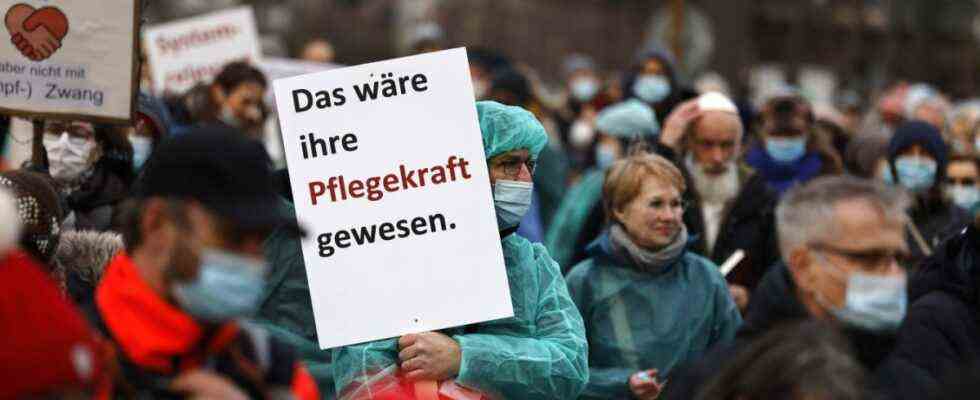The care industry is a diverse chorus, represented by a multitude of associations, far from speaking with one voice. Bavaria’s Prime Minister Markus Söder experienced this a few days ago when he announced that he would suspend the compulsory vaccination in the health care system decided by the Bundestag and Bundesrat. It rained criticism – also from the care. Klaus Holetschek, Minister of Health in the Söder cabinet, had previously obtained the opinion of several associations on the subject.
For example, Georg Sigl-Lehner, President of the Association of Nurses in Bavaria, was interviewed. He says that it was already foreseeable in November that compulsory vaccination in the healthcare system could not be implemented as planned. “Otherwise the facilities would have to release ten to 15 percent of the employees.” This puts the supply at risk. For patients in clinics and residents of nursing homes as well as for people who are cared for in their own four walls by outpatient services.
Sigl-Lehner argues that the facilities do not play a major role in the current infection process. “Of course we have to meet a need for protection, but we’ve been doing that for a long time.” If the entire population had been vaccinated to the same extent as the employees in the homes and hospitals – Sigl-Lehner estimates the immunization rate there at around 90 percent – “then we would have been spared the fourth corona wave”.
The Nursing Council only has a “facility-related” obligation
Christine Vogler, President of the German Nursing Council, argues similarly. Vaccination is a task for society as a whole that should not be passed on to caregivers alone. When she was on the talk show “Anne Will” at the beginning of November, she fought tooth and nail against compulsory vaccination only for nurses. The care council supports the facility-related vaccination requirement, which is to apply from mid-March and also includes physiotherapists, cleaning staff and housekeeping staff in the facilities. But only there, says Vogler, “where nursing care can be maintained”. The past has shown, she adds, that even unvaccinated people could “safely care for those in need of care within the framework of hygiene measures”. Her commitment to vaccination is just as credible as that of the Bavarian state government: a few days after Söder’s announcement that she was undermining current law, she emphasized that Bavaria was “unchanged about facility-related vaccination”.
At the German Professional Association for Nursing Professions (DBfK), which is united with several other nursing associations under the umbrella of the German Nursing Council, President Vogler sees things differently. The vaccination requirement is an additional expense for the facilities, says Natalie Sharifzadeh, Managing Director of the DBfK Nordost in Berlin. The fact that Söder, a few weeks before the introduction of compulsory vaccination, is now pretending that security of supply is at stake is, however, strange. “We have been preaching for years that there are too few employees in the facilities.” Nevertheless, she believes the law is correct. The idea that unvaccinated people are still standing at the bedside or that senior citizens in nursing homes are holding drinking cups does not appeal to her. That also endangers the security of supply, says Sharifzadeh, alluding to the risk for those in need of care.
Claudia Moll, a trained geriatric nurse and recently the federal government’s care agent, is also concerned with this idea. “Neither would she want my mother, for example, to be cared for by unvaccinated staff in the event of an emergency,” she said on request. In addition, she does not expect that there will be more supply bottlenecks as a result of the facility-related compulsory vaccination. The vaccination rate among nursing staff is high “and I am sure that even more will be vaccinated”. After all, they had seen in the facilities that the vaccination worked: the facilities recorded far fewer “bad corona-related deaths” than in previous waves. The obligation to vaccinate in the care facilities must be implemented, Moll demands, “without ifs and buts”. Everyone involved is asked to “pull together here so that we can finally get out of the pandemic”.
“We’re doing everything anyway. And nobody cares about our concerns.”
Will the SPD politician reach Sylvia Bühler, who heads the health department at Verdi, with her appeal? The Verdi trade union indicated at the beginning of the discussion that it was critical of the facility-related compulsory vaccination. She immediately coordinated with the base, explains Verdi board member Bühler, and learned about heated debates in the companies. Even vaccinated employees would have felt “professionally attacked” by the exclusively institution-related vaccination requirement. “They ask: Why only us? We do everything anyway. And nobody takes care of our concerns.”
The law is not thought through to the end. There are regions like Saxony or Bavaria where the vaccination rate is “poor”. The nursing staff on site could not simply free themselves from the skepticism that is widespread there. Of course, people in need of care should be protected. “But the necessary staff is also needed for nursing and care, and the staffing level is already far too thin. We can’t afford to lose more nursing staff either,” says Bühler. “It’s a dilemma.”

